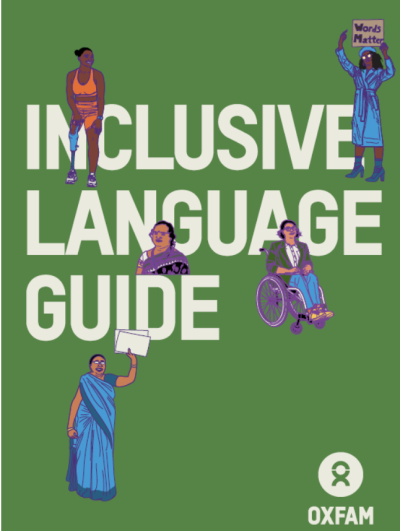
- Report year:2024
- Organisation: Policity & Practice Oxfam
Language has the power to reinforce or deconstruct systems of power that maintain poverty, inequality and suffering. As we are making commitments to decolonization in practice, it is important that we do not forget the role of language and communications in the context of inequality. The Inclusive Language Guide is a resource to support people in our sector who have to communicate in English to think about how the way they write can subvert or inadvertently reinforce intersecting forms of inequality that we work to end. The language recommended is drawn from specialist organizations which provide advice on language preferred by marginalized people, groups and communities, and by our own staff and networks, to support us to make choices that respectfully reflect the way they wish to be referred to. We want to support everyone to feel empowered to be inclusive in their work, because equality isn’t equality if it isn’t for everyone.
Many Latin American countries have made tremendous leaps towards gender equality, this progress has not been equally shared across the region. Some countries have achieved gender parity, while others have less than 20 percent of women in public roles. And the progress that has been made tends to be centred more at the parliamentary level rather than in local government or executive roles. Further, for a region as diverse as Latin America, black and indigenous groups – and women in particular – are strikingly underrepresented.
Despite the progress, there are still major obstacles that women face in getting into and remaining in politics – such as socioeconomic inequalities, cultural and caring norms and political violence. Quotas – when properly set up – can go a long way in countering the effect of these disadvantages getting into power, but their effect can still impact women’s ability to effect change and take on more senior roles.
Women in politics in Latin America have played a crucial role in pushing for laws to increase gender equality through parity legislation, legalisation of abortion and tackling violence against women and girls.
Our overview shows that while there are many places where more evidence is needed to paint a fuller picture – such as in the representation of non-white Latin American women, and the policy impact of the women introduced through quotas – there are many reasons to be optimistic for the representation of women in Latin America and to seek to learn the lessons from this region to increase women’s political representation on a global level.
Many Latin American countries have made tremendous leaps towards gender equality, this progress has not been equally shared across the region. Some countries have achieved gender parity, while others have less than 20 percent of women in public roles. And the progress that has been made tends to be centred more at the parliamentary level rather than in local government or executive roles. Further, for a region as diverse as Latin America, black and indigenous groups – and women in particular – are strikingly underrepresented.
Despite the progress, there are still major obstacles that women face in getting into and remaining in politics – such as socioeconomic inequalities, cultural and caring norms and political violence. Quotas – when properly set up – can go a long way in countering the effect of these disadvantages getting into power, but their effect can still impact women’s ability to effect change and take on more senior roles.
Women in politics in Latin America have played a crucial role in pushing for laws to increase gender equality through parity legislation, legalisation of abortion and tackling violence against women and girls.
Our overview shows that while there are many places where more evidence is needed to paint a fuller picture – such as in the representation of non-white Latin American women, and the policy impact of the women introduced through quotas – there are many reasons to be optimistic for the representation of women in Latin America and to seek to learn the lessons from this region to increase women’s political representation on a global level.
